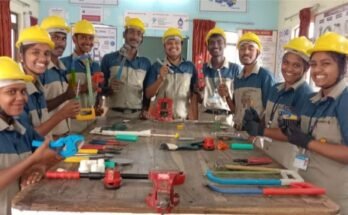Skills and knowledge are the driving forces of any country’s economic growth and social development. Countries with higher and better levels of skills regulate more effectively the challenges and opportunities of the world of work.
The concept of skill development in India embraces its roots post-independence when the initial focus was on establishing a formal TVET system to build and strengthen dedicated institutions catering to only manufacturing and engineering-related courses. In India, there are multifarious skill development models like government-funded programmes that fully or partially subsidize training/apprenticeships, market-led training (where trainees pay for the course), market-led apprenticeships and industry-led/ on-the-job (OJT) training.
India’s demographic dividend in terms of the youth population is a key factor that is expected to propel economic growth. There is a clear-cut gap between demand and supply which is resulting in youth unemployment and industries struggling for trained and skilled manpower. Undoubtedly there are gaps in the current models of Source Trained and Placed (STP) which need immediate attention for refinement of the skills ecosystem in India.
- Training Partners (TP) are not distributed evenly across the locations, the sectors and the job roles. TPs prefer courses which are easy for them to manage and cost-effective. Some of the locations are exhausted for mobilization while others remain untouched.
- The machines or equipment used in the training centres and ITIs or Polytechnics for running courses related to manufacturing or engineering are not up to date as per the current industry standards.
- There is a huge mismatch between what the youth aspire to learn and the skill training course they are offered/enrolled in. Due to the young age and lack of knowledge sometimes youth aspiration is influenced by social factors like what their friends are doing instead of what they want and can do as per their competency.
- The candidates are being trained in their home district or home state but there might be a possibility that the trade in which they are trained doesn’t have local placement options.
Join our exclusive community with a simple click! Embark on a journey of professional growth and be the first to get the latest insights – Subscribe to our Newsletter on LinkedIn
- The candidates are attending training since it is offered free of cost but they are reluctant to relocate to join the job offered. The candidates who got ready to relocate face challenges like new states/places, high cost of living, unavailability of their local food, cultural differences, language barriers etc.
- There is a serious mismatch between the education and skills that the youth attain and what the labour market demands. There is a lack of interaction between the industry partners and trainers due to which the skill sets taught in the centres do not end up meeting the requirements of the employers.
- Women in our country especially in rural areas are still hesitant to join the skill training courses due to many constraints like access to the training centres, lack of basic amenities like separate washrooms for females, gender stereotyping in choices of trades, societal challenges like marriage and distance of the enterprise from the residence.
- The trainer plays a pivotal role in training quality but trainers’ knowledge is confined to their industry experience only and they are not updated with the new industrial norms. Thus, they are not able to provide job-focused skills to the candidates. This calls for the requirement of the up-skilling and re-skilling of the trainers.
- The industry partners are less willing to participate in government initiatives due to the complexity of the implementation of projects and adherence to government norms and regulations.
India is progressively moving towards being a knowledge economy, where skills are widely recognized as the important lever of economic growth, but the perception of vocational education or skill training is still doubtful. We can take small steps towards overcoming these challenges like skill upgradation and assessment of trainers to improve their quality, improving the quality of Migration Support Centres (MSCs) for supporting the candidates placed in other states, having proper screening mechanism of the candidates at mobilization level, bridging the demand-supply gap by industry-institute collaboration, upgrading the course curriculum based on the changing industry demands, and so on.
The efficiency and effectiveness of skilling programmes can be improved by integrating them with technology. Lastly, conducting impact assessments of existing models, analyzing future job trends, and studying the effects of technological advancements can build a robust knowledge base to advocate for policy-level changes.
(Disclaimer: The views expressed in the article above are those of the authors Ms. Iqra Salim, Senior Analyst, IPE Global Ltd and Ms. Pommi Biswas, Manager, IPE Global Ltd. The matter and intent of this article has not been edited by skillreporter.com. Skill Reporter shall not be responsible for any damage if caused to any person/ organization directly or indirectly.)



